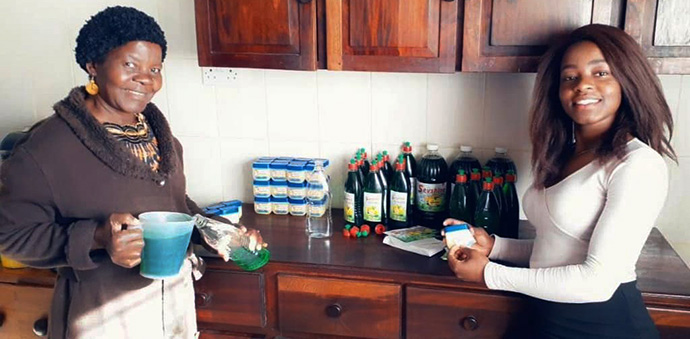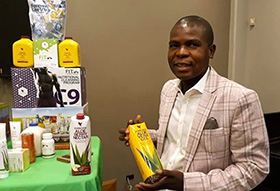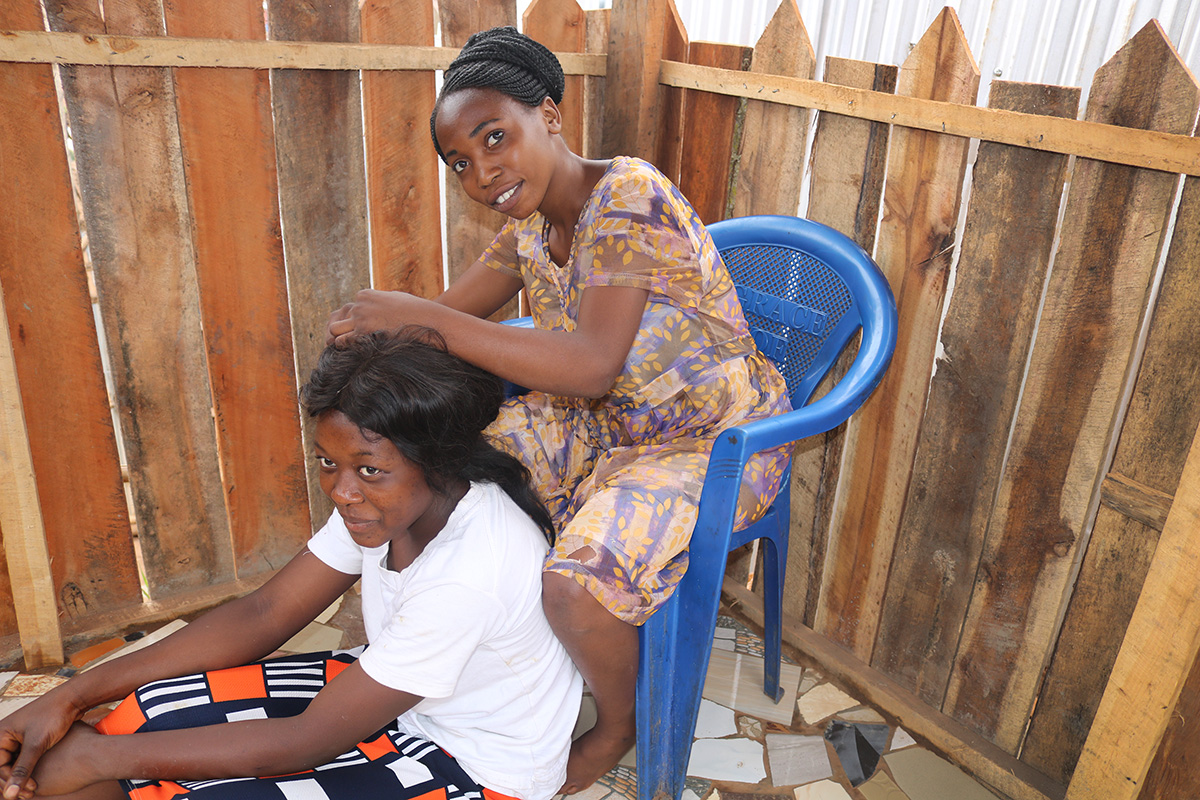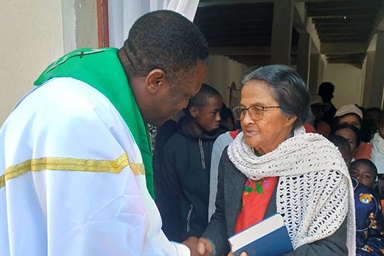United Methodists in Zimbabwe and Congo are building new businesses or adapting old ones to make ends meet during the COVID-19 pandemic.
In Zimbabwe, 22-year-old Seviria Taedza has found success as an entrepreneur since the country imposed lockdowns in March.
The second youngest in a family of six daughters and a member of Gweru West United Methodist Church, Taedza learned to make detergent at a girls’ empowerment workshop organized by the Zimbabwe Area’s Ministry with Women, Youth and Children.
The training took place in early March and was funded through a grant from the United Methodist Committee on Relief, said Tendai Rebecca Gurupira, coordinator for the ministry.
“The church’s main objective is to empower youths in entrepreneurship and for them to stand against gender-based violence,” Gurupira said.
She said she is impressed by how Taedza changed her life by putting into practice the skills she gained during the workshop.

Seviria Taedza, 22, and her mother, Muidzo, fill bottles with dishwashing liquid and petroleum jelly at their home in Gweru, Zimbabwe. Taedza learned to make detergent at a girls’ empowerment workshop sponsored by The United Methodist Church in Zimbabwe. She markets her products under the names Sevsoft and Sevshine. Photo by Kudzai Chingwe, UM News.
“In a very short space of time, her business has boomed, transforming her life, family and church for the better.”
A recent graduate with a diploma in metallurgy (mineral processing), Taedza said with the unemployment rate in Zimbabwe at 90%, new graduates are having a tough time.
She said the church training gave her a leg up.
“When I was trained, I saw a light at the end of the tunnel. I started my project in May 2020 (and) since then, my production and income are increasing steadily,” she said.
She said she sells to individuals and small grocery shops, and has experimented with ratios and scents to make her products stand out.
“I have branded my products as Sevsoft petroleum jelly in 100-millileter bottles and Sevshine dishwashing liquid,” Taedza said.
The Rev. Munyaradzi Ndaradzi, pastor in charge at Gweru West United Methodist Church, praised Taedza for her efforts, which he believes will motivate others.
“What she has done will raise the flag of UMC high and will give other youths the desire and eagerness to follow suit,” Ndaradzi said. “Her success story will be a source of motivation to someone who feared to start a business.”
He said Taedza also is giving back to the church with the money she has made.
“So far, Seviria has managed to repair the church window panes, thus taking good care of the house of the Lord,” he said, noting that she participates in tithing and makes other donations when possible.
Taedza also has been able to take care of small expenses at home.
Her mother, Muidzo Taedza, said she has seen a great transformation in her daughter.
“I no longer financially support her. Instead, she is meeting some of the basic household needs and expenses. She has become a role model to her siblings and the society at large,” she said.
“We will always be indebted to God and the church for unearthing her talent. I never knew that she had the potential to start a business like this.”
Muidzo Taendza said she and the rest of the family are helping to nurture the business.
“After my household chores (as I am unemployed), I help her to prepare, package, advertise and sell her products.”
Seviria Taendza said she plans to take what she’s learned from the church and expand her business.
“My wish is to grow big and have my own manufacturing company and be able to supply to different areas around the globe,” she said.
In the Eastern Congo Episcopal Area, Marie Aganze, 19, who dropped out of school at age 10 because her parents couldn’t afford her school fees, is finding success as a hairdresser.
She took entrepreneurship training last year led by Dr. Marie Claire Unda, supervisor of the Maternal and Child Health Program in East Congo and wife of Bishop Gabriel Yemba Unda.
Unda said she is helping young adults and women who fail to advance in their education to be entrepreneurs.
“We have opened training and learning centers in each annual conference to empower the girls and women in entrepreneurship,” she said, noting that Aganze trained at the United Methodist Women Center of Kivu in Goma and now is prospering despite the pandemic.
Aganze said she has built a client base over the past year and has remained “on call” during the lockdowns, mainly working out of people’s homes.
She said the training has helped her to become self-sufficient.
“I thank the church, especially the wife of Bishop Unda, for the concern she has for the women and girls of the region who have not progressed with their primary, secondary and university studies,” she said. “Today, I earn a monthly income of $400. I am proud of my achievements, to learn a trade in the field of hairdressing and became useful in society.”
In Zimbabwe, with markets closed during the lockdown to stop the spread of the coronavirus, those who sell their wares have had to adapt their business plans.

Tendai Kativhu, connectional ministries chair at Mainway Meadows United Methodist Church in Harare, Zimbabwe, has grown his aloe business through online marketing during the coronavirus pandemic. Photo by Chenayi Kumuterera, UM News.
Tendai Kativhu, connectional ministries chair at Mainway Meadows United Methodist Church in Harare, said he has been building relationships during the pandemic.
“While the global world is closed, I have managed to plan, create, position and promote my products and services in a global market through social media networking. I have made a lot of relationships with more than 200 people, some of them I never knew before. This has helped me to open doors to more opportunities,” he said.
He said he has been able to sell his aloe products to people outside the country, allowing him to expand his business.
“Network marketing … (has) transformed me from being an employee to being an entrepreneur. It has given me the freedom and time to do what I want and how I want it,” he said.
Charity Chitembeya, a member of Harare Inner City United Methodist Church, said she noticed others on social media making a living during the pandemic and it inspired her to do the same.
“COVID-19 is taking its toll on the world, causing deaths, illness and economic despair and likely to cause global poverty, but networking business is open to help people survive during this pandemic. Now, my business is at its initial stages, supplying detergents and peanut butter only to one suburb in Harare, (but it is helping) me to survive each day,” she said.
Erica Kudakwashe Matongo, a member at Chisipite United Methodist Church, has her own tailoring business and has been using social media to market her products during the lockdown. She said she models the clothes and her photographer daughter takes pictures to post on Facebook and WhatsApp.
“The more you grow, the more you learn … you become more effective at producing new products or services. … Competing on a global basis allows customers worldwide to be better informed and more focused on the products and services you offer,” she said.
Mazvita Madondo, who also attends Chisipite United Methodist Church, is the managing director of Consultus Publishing Services, which sells textbooks to elementary and high schools. Her business has shifted during the pandemic.
“To a greater extent it has helped with creating brand and product awareness to our nontraditional market — that is the general public and parents. Since schools are closed, our target has been parents for home schooling. But it is the way to go in the post-COVID business environment,” she said.
On social media, she encourages her clients to share her business photos and refer friends.
“(It is) yielding results as we are getting responses from abroad, though still slow, but we anticipate an increase in traffic in the next few months,” she said.
Chingwe is a communicator for the Zimbabwe East Conference. Communicators Chenayi Kumuterera in Zimbabwe and Philippe Kituka Lolonga in Congo contributed to this report.
News media contact: Vicki Brown at (615) 742-5470 or [email protected]. To read more United Methodist news, subscribe to the free Daily or Weekly Digests.
Like what you're reading? Support the ministry of UM News! Your support ensures the latest denominational news, dynamic stories and informative articles will continue to connect our global community. Make a tax-deductible donation at ResourceUMC.org/GiveUMCom.




